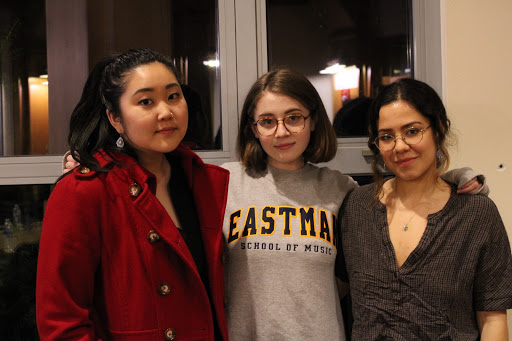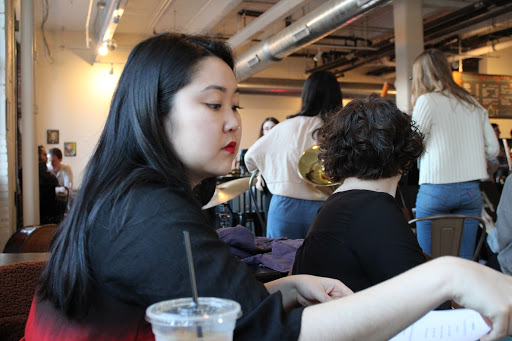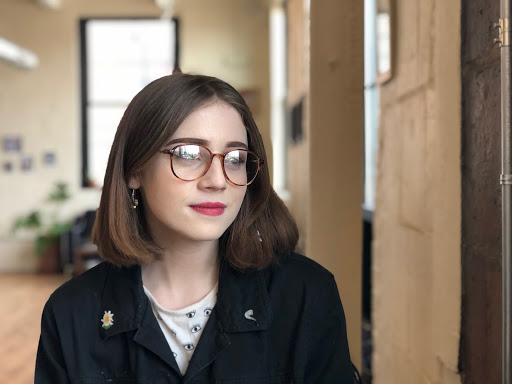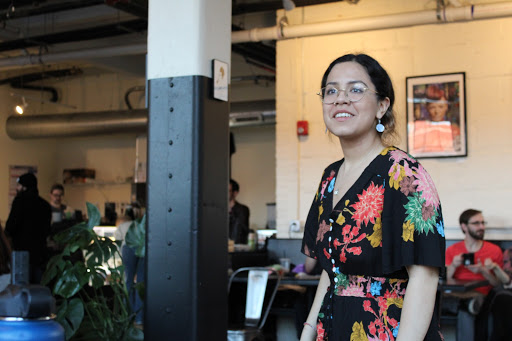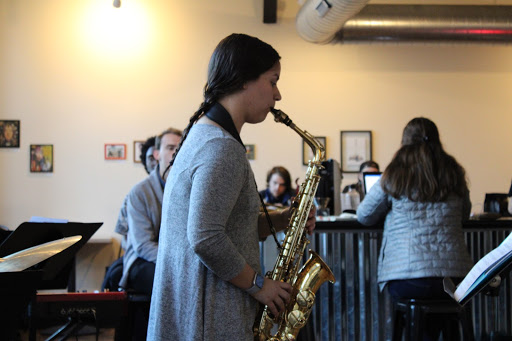For as long as there has been inequality, there have been those who fight against it.
And for Women Mean Business, a newly-formed organization at Eastman meant to combat inequality in music, that means staying in on a Friday night to talk about systemic exclusion in your industry. On Friday, April 5, the first day of their three-day Women Mean Business Festival, the co-founders and their panelists congregated to talk about “misrepresentation” in the music world.
One co-founder defined “misrepresentation” as the “neglect of anything new or different,” while another framed it as the effects of social stigmas on underrepresented groups.
Though their title specifies “women,” the organization takes the buck further.
“It’s so easy to say if we’re going to represent women, we’re just going to represent white women,” Nakanishi said, nodding to third wave philosophies of feminism.
The three-day festival honored all musicians traditionally neglected because of their race, sexual orientation, gender — the list goes on. As people took their seats at the table of the Eastman Dean’s Dining, it became clear that Women Mean Business was doing something right.
The talk was not only well-attended, but well-balanced in gender, race, and familiarity with the subject matter.
Over the next few days, more people convened — one day at Fuego’s coffee shop, the next at co-founder Luisa Hidalgo’s apartment — to listen to famous works by minority women composers, and original works by female Eastman students.
Through frustration, passion, and coincidence, each co-founder took a different path to joining the fight.
“We mean business as in, this is happening, and maybe whether you like it or not.”
Naomi Nakanishi
Growing up, Naomi Nakanishi wanted to be white. Most of her classmates at elementary school were, and they made it known that “different” would not be tolerated.
“They would do that thing,” Nakanishi said, pulling back at the corners of her eyes. “I remember asking my mom, ‘Mom why are we not white? Why are we Asian?’”
In church, she was one of few minorities at youth group. She remembered being ignored by the white parishioners, and how this caused her to see “an uncomfortable divide between us and them.”
When she began to attend a liberal arts high school, these encounters took on new meaning. Nakanishi said her classmates were loudly and proudly different — although they faced discrimination for it.
“I had friends who literally were kicked out of their houses because they came out to their parents,” she said. “It helped shape how I saw this inequity and the world.”
The festival was not Nakanishi’s first time trying to speak about being an Asian-American jazz pianist at a top-tier music institute. At one point in her interview, Nakanishi paused to count the number of women in the jazz department.
The department comprises 66 people — seven are women. No women have enrolled in the past two years, Nakanishi added.
Eastman Dean John Hain, who confirmed the numbers, said that “Eastman is certainly committed to diversifying our student body in all regards.”
He cited the role of societal gender bias in slanting the playing field before college music recruiters ever step on the scene.
“[Y]ou’re trying to overcome the gender bias that’s present in elementary school level,” he said. “So it takes a long time to effect change.”
The effects of this gender imbalance are subtle.
Nakanishi said she feels it in how the energy of the band comparatively dips when playing for a female soloist. And in the way women rarely get asked to play for gigs or recitals. She recalled several conversations with other women in the department where they wondered, “‘Why does no one call us? Do we suck?’”
Starting a conversation around these concerns isn’t easy.
Last year, Nakanishi organized a recital featuring her own compositions and poetry on being a female musician of color, which “four or five people” attended.
Hoping to start more conversation on diverse identities at Eastman, Nakanishi joined UR’s Commission on Women and Gender Equity in Academia and reached out to Title IX coordinator Morgan Levy.
Levy organized a meeting at Eastman to hear student concerns, which Nakanishi attended. Her future business partners were there, too.
“I don’t want all these strong talented women being forgotten.”
Olivia Galante
Two years ago, when Olivia Galante went thrift-shopping for her apartment, she found a license plate that said “Women Mean Business.” It has hung on her door ever since.
Galante comes from a family of musicians: her cousin and brother both went to top-tier music schools, her dad is a trumpeter. Galante is a clarinetist, like her mother.
Why does she play?
“It just makes me excited,” she said, her eyes lighting up. “My favorite thing is to picture myself as one of my idols and go on stage pretending to have their confidence,” she said. “It almost makes it your own.”
Given classical music’s demographics, most of her idols were men. She noticed early on that there were few female clarinetists in national orchestras, even though she saw “a lot of female players in college.”
“For the first eight years of playing the clarinet, I never even got to touch work by a woman,” she recalled. She didn’t find this strange at first.
But when she took a music history class last year, she realized just how much about women musicians she had never learned — like the story of Wendy Carlos, who composed the soundtrack for Clockwork Orange and came out as transgender in 1979.
“It was just so upsetting that we didn’t know anything,” she said. “That we had never heard it before.”
The accomplishments of women musicians are not the only thing she feels goes undiscussed at Eastman.
Galante was sexually harassed her second month at Eastman, being called “hot” and “baby” by a professor in rehearsals.
“Did I get here because of my talent or because people thought I was attractive?” she wondered.
Galante wanted to do more. She and her good friend, Luisa Hidalgo, had entertained the idea of launching a business for women in music before. Galante posted on Facebook, encouraging interested performers to contact her about organizing a festival.
Nakanishi saw it and reached out to her, but the idea fell off the radar as the semester got busier. When all three ran into each other at Levy’s Title IX meeting, however, it resurfaced.
As they planned the festival, their discussion wandered into plans to host more festivals, to start a website, and go all out.
They needed a name first. In that moment, Galante remembered her license plate: Women Mean Business.
“All of a sudden everyone was like, ‘Yes. That is it.’”
“I’ve always had a very clear idea of the kind of woman I wanted to be.”
Luisa Hidalgo
Vocalist Luisa Hidalgo has lived in the same neighborhood, the Upper West Side, all her life. Yet she identifies strongly with her Latina heritage — her entire family is from Mexico, a point of pride for her.
It’s also something she has had to assert, she said, because people often misperceive her as white. Growing up, she and her younger sister talked about this, realizing their outside appearance often allowed them to sidestep “that immediate confrontation.”
“It was the minute we actually opened our mouths to say [we were Mexican] that the jokes started rolling in,” Hidalgo said.
Though race factored heavily into her high school experiences, Hidalgo’s experience in the music world has been tinted by her gender. Female musicians, she said, are expected to be perfect in order to justify their place. Hidalgo remembered being singled out this way when she made a mistake during a jazz rehearsal and became the inspiration for one professor’s rant about why singers are inferior musicians.
“Men are taught to take risks,” she said, “and instrumentalists make mistakes all the time.”
In that particular scenario, Hidalgo was also the only woman present — something she’s used to.
“It’s easy to feel left out,” Hidalgo said. She observed that the current demographics present female musicians with a difficult choice: become a “bro” and have the same respect, or be yourself and be dismissed.
She was particularly pleased with the attendance at the panel discussion, which she feels reached people who, at the moment, “don’t see what’s wrong.”
Embracing diversity is easy to pledge to, she said, but following through is a different story.
“I can bet every conductor, composer, teacher, professor in Eastman will be like ‘yes,’ we should have more diversity,” Hidalgo continued, “But will they fight for it?”
At any rate, she will. Hidalgo wants Women Mean Business to celebrate the typically un-celebrated — the “many women faces that aren’t given enough attention, who aren’t in any theory or curriculums, but should be.”
In short — she wants to “gas women up.”
With one festival under their belt, the ladies are turning their attention to their website and building more contacts with Rochester musicians.
Simultaneously, they plan to work with Eastman administration to change the curriculum so that it includes more examples of female composers.
Their end goal is that one day they won’t be needed.
Said Galante, “I want to get to a place where female composers are regular instead of some special rare thing, where it’s not even a second thought.”
Correction (5/15/19): A previous version of this article incorrectly stated that Eastman had not admitted women to its jazz department in the last two years. Actually, women have been admitted, but chose not to enroll.
